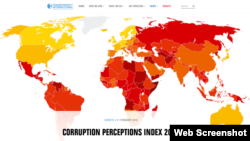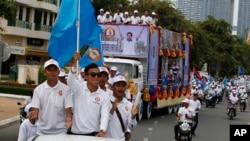Development in Cambodia has come at a cost, with high levels of inequality still defining the Southeast Asian nation’s booming economy and elite interests controlling much of the wealth.
But Prime Minister Hun Sen has set his sights on turning Cambodia into a higher middle-income country by 2030 and a developed nation by 2050. Economic growth in Cambodia has remained steady at about 7 percent for several years, with income per capita rising to about $1,200, positioning the country among lower middle-income countries, according to the World Bank.
Cambodia was categorized as a least developed nation until several years ago. Widespread poverty still afflicts many rural and urban communities.
Sophal Ear, an associate professor of diplomacy and world affairs at Occidental College in Los Angeles, says only those at the top of the pyramid truly benefit from Cambodia’s rapid growth.
“There is a very strong top of the economy that is benefiting from its access to the political power, ability to create a monopoly, and control of trade. It [Cambodia] is a gatekeeper economy,” he said.
Poor Governance
Cambodia consistently ranks near the bottom of corruption indexes, coming 161st out of 180 countries in Transparency International’s latest Corruption Perceptions Index. On economic freedom, rule of law and ease of doing business, Cambodia also falls short.
“Cambodia is the world champion in the area of corruption year after year. That is a bad news for people in Cambodia. They are paying the price of this corruption. They have to pay the consequences,” Ear said after a recent think-tank event in Washington DC. “Paying corruption is literally wasted money. That money isn't useful for any purposes, but to make certain people who have power richer and those people can use that power or those resources to build themselves more.”
Workers’ Rights
More than 800,000 Cambodians are estimated to work in the country’s garment industry, which contributes to the high official growth figures. But critics continue to point to rights violations and low wages as evidence of the growing pains of Cambodia’s burgeoning economy. Wages barely keep pace with inflation, leading to effective wage cuts, despite several hikes in the minimum wage in recent years.
It was hoped a trade union law passed in 2016 could help provide workers with further protections, but unionists have said it has been used as a tool to prevent workers from effectively and freely organizing. In January 2014, the authorities deployed heavily armed military police to violently put down garment worker strikes in the capital. Several union leaders have since faced what unionists say are politically motivated charges.
Ou Tephalin, the vice president of the Cambodian Food and Service Workers Federation, said despite the minimum wage increases, cost of living increases keep working families in poverty.
“The minimum wage has been increased, yet the cost of living has also risen, especially food and rental fees,” he said in a phone interview with VOA Khmer.
‘Negative Peace’
The slow progress towards a more equitable and peaceful Cambodia observed by civil society groups runs contrary to the view of the ruling Cambodian People’s Party, which claims it has overseen an unprecedented period of peace and stability.
Cambodia has continued to drop in global peace indexes, while freedom of assembly and political rights continue to be curtailed. The dissolution of the Cambodia National Rescue Party in November on charges its leaders conspired to overthrow Hun Sen followed the arrest and detention of more than a dozen CNRP officials and supporters since the 2013 election.
“It’s seen to be a backward trend for political rights in Cambodia,’’ said Sotheara Yoeurng, a Cambodian election expert. ‘’A group of people who have different political tendencies from the ruling party has been mistreated and banned from the political sphere—the persecution of the CNRP’s leaders and the dissolution of the party.”
A recent report by the US-based Center for Strategic and International Studies pointed to intimidation, arrests, detention, murder, and threats made against activists and political commentators in recent months.
“It minimizes the rights and freedoms of the citizens guaranteed by constitutional law,’’ Yoeurng told VOA. ‘’The civil society organizations, especially the advocacy and rights bodies, have narrow spaces to carry out their activities, particularly before the upcoming national election.”
On July 10, Committee for Free and Fair Elections in Cambodia (Comfrel), an election monitoring group in Phnom Penh, was accused of promoting social unrest. “Comfrel sees the accusation as a threat and intimidation over their rights to voluntarily observe the election,” the organization said in a statement.
Land Reform
Land reforms in Cambodia have affected the poor, with land grabbing and forced evictions continuing as large plantations and companies vie for land held or claimed by rural villagers, sometimes living near or below the poverty line. Land and housing rights activists have been arrested, beaten, threatened and imprisoned over their campaigning.
Hun Sen has said that his biggest mistake in power has been his government’s handling of the land rights issue. “When we granted economic land concessions, disputes started. It happened because we did not properly manage it,” Hun Sen said in an interview with filmmaker Robert Lieberman in 2015.
The CPP has pledged during the recent election campaign to improve living standards by continuing to focus on economic development and to meet its Sustainable Development Goals by 2030.










